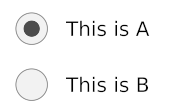Struct iced_native::widget::radio::Radio
source · pub struct Radio<Message, Renderer>where
Renderer: Renderer,
Renderer::Theme: StyleSheet,{ /* private fields */ }Expand description
A circular button representing a choice.
Example
#[derive(Debug, Clone, Copy, PartialEq, Eq)]
pub enum Choice {
A,
B,
}
#[derive(Debug, Clone, Copy)]
pub enum Message {
RadioSelected(Choice),
}
let selected_choice = Some(Choice::A);
Radio::new(Choice::A, "This is A", selected_choice, Message::RadioSelected);
Radio::new(Choice::B, "This is B", selected_choice, Message::RadioSelected);
Implementations§
source§impl<Message, Renderer> Radio<Message, Renderer>where
Message: Clone,
Renderer: Renderer,
Renderer::Theme: StyleSheet,
impl<Message, Renderer> Radio<Message, Renderer>where Message: Clone, Renderer: Renderer, Renderer::Theme: StyleSheet,
sourcepub const DEFAULT_SIZE: f32 = 28f32
pub const DEFAULT_SIZE: f32 = 28f32
The default size of a Radio button.
sourcepub const DEFAULT_SPACING: f32 = 15f32
pub const DEFAULT_SPACING: f32 = 15f32
The default spacing of a Radio button.
sourcepub fn new<F, V>(
value: V,
label: impl Into<String>,
selected: Option<V>,
f: F
) -> Selfwhere
V: Eq + Copy,
F: FnOnce(V) -> Message,
pub fn new<F, V>( value: V, label: impl Into<String>, selected: Option<V>, f: F ) -> Selfwhere V: Eq + Copy, F: FnOnce(V) -> Message,
sourcepub fn spacing(self, spacing: impl Into<Pixels>) -> Self
pub fn spacing(self, spacing: impl Into<Pixels>) -> Self
Sets the spacing between the Radio button and the text.
Trait Implementations§
source§impl<'a, Message, Renderer> From<Radio<Message, Renderer>> for Element<'a, Message, Renderer>where
Message: 'a + Clone,
Renderer: 'a + Renderer,
Renderer::Theme: StyleSheet + StyleSheet,
impl<'a, Message, Renderer> From<Radio<Message, Renderer>> for Element<'a, Message, Renderer>where Message: 'a + Clone, Renderer: 'a + Renderer, Renderer::Theme: StyleSheet + StyleSheet,
source§impl<Message, Renderer> Widget<Message, Renderer> for Radio<Message, Renderer>where
Message: Clone,
Renderer: Renderer,
Renderer::Theme: StyleSheet + StyleSheet,
impl<Message, Renderer> Widget<Message, Renderer> for Radio<Message, Renderer>where Message: Clone, Renderer: Renderer, Renderer::Theme: StyleSheet + StyleSheet,
source§fn on_event(
&mut self,
_state: &mut Tree,
event: Event,
layout: Layout<'_>,
cursor_position: Point,
_renderer: &Renderer,
_clipboard: &mut dyn Clipboard,
shell: &mut Shell<'_, Message>
) -> Status
fn on_event( &mut self, _state: &mut Tree, event: Event, layout: Layout<'_>, cursor_position: Point, _renderer: &Renderer, _clipboard: &mut dyn Clipboard, shell: &mut Shell<'_, Message> ) -> Status
source§fn mouse_interaction(
&self,
_state: &Tree,
layout: Layout<'_>,
cursor_position: Point,
_viewport: &Rectangle,
_renderer: &Renderer
) -> Interaction
fn mouse_interaction( &self, _state: &Tree, layout: Layout<'_>, cursor_position: Point, _viewport: &Rectangle, _renderer: &Renderer ) -> Interaction
source§fn draw(
&self,
_state: &Tree,
renderer: &mut Renderer,
theme: &Renderer::Theme,
style: &Style,
layout: Layout<'_>,
cursor_position: Point,
_viewport: &Rectangle
)
fn draw( &self, _state: &Tree, renderer: &mut Renderer, theme: &Renderer::Theme, style: &Style, layout: Layout<'_>, cursor_position: Point, _viewport: &Rectangle )
Draws the
Widget using the associated Renderer.Auto Trait Implementations§
impl<Message, Renderer> RefUnwindSafe for Radio<Message, Renderer>where Message: RefUnwindSafe, <Renderer as Renderer>::Font: RefUnwindSafe, <<Renderer as Renderer>::Theme as StyleSheet>::Style: RefUnwindSafe,
impl<Message, Renderer> Send for Radio<Message, Renderer>where Message: Send, <Renderer as Renderer>::Font: Send, <<Renderer as Renderer>::Theme as StyleSheet>::Style: Send,
impl<Message, Renderer> Sync for Radio<Message, Renderer>where Message: Sync, <Renderer as Renderer>::Font: Sync, <<Renderer as Renderer>::Theme as StyleSheet>::Style: Sync,
impl<Message, Renderer> Unpin for Radio<Message, Renderer>where Message: Unpin, <Renderer as Renderer>::Font: Unpin, <<Renderer as Renderer>::Theme as StyleSheet>::Style: Unpin,
impl<Message, Renderer> UnwindSafe for Radio<Message, Renderer>where Message: UnwindSafe, <Renderer as Renderer>::Font: UnwindSafe, <<Renderer as Renderer>::Theme as StyleSheet>::Style: UnwindSafe,
Blanket Implementations§
source§impl<S, D, Swp, Dwp, T> AdaptInto<D, Swp, Dwp, T> for Swhere
T: FloatComponent,
Swp: WhitePoint,
Dwp: WhitePoint,
D: AdaptFrom<S, Swp, Dwp, T>,
impl<S, D, Swp, Dwp, T> AdaptInto<D, Swp, Dwp, T> for Swhere T: FloatComponent, Swp: WhitePoint, Dwp: WhitePoint, D: AdaptFrom<S, Swp, Dwp, T>,
source§fn adapt_into_using<M>(self, method: M) -> Dwhere
M: TransformMatrix<Swp, Dwp, T>,
fn adapt_into_using<M>(self, method: M) -> Dwhere M: TransformMatrix<Swp, Dwp, T>,
Convert the source color to the destination color using the specified
method
source§fn adapt_into(self) -> D
fn adapt_into(self) -> D
Convert the source color to the destination color using the bradford
method by default
source§impl<T, U> IntoColor<U> for Twhere
U: FromColor<T>,
impl<T, U> IntoColor<U> for Twhere U: FromColor<T>,
source§fn into_color(self) -> U
fn into_color(self) -> U
Convert into T with values clamped to the color defined bounds Read more
source§impl<T, U> IntoColorUnclamped<U> for Twhere
U: FromColorUnclamped<T>,
impl<T, U> IntoColorUnclamped<U> for Twhere U: FromColorUnclamped<T>,
source§fn into_color_unclamped(self) -> U
fn into_color_unclamped(self) -> U
Convert into T. The resulting color might be invalid in its color space Read more
source§impl<T, U> TryIntoColor<U> for Twhere
U: TryFromColor<T>,
impl<T, U> TryIntoColor<U> for Twhere U: TryFromColor<T>,
source§fn try_into_color(self) -> Result<U, OutOfBounds<U>>
fn try_into_color(self) -> Result<U, OutOfBounds<U>>
Convert into T, returning ok if the color is inside of its defined
range, otherwise an
OutOfBounds error is returned which contains
the unclamped color. Read more